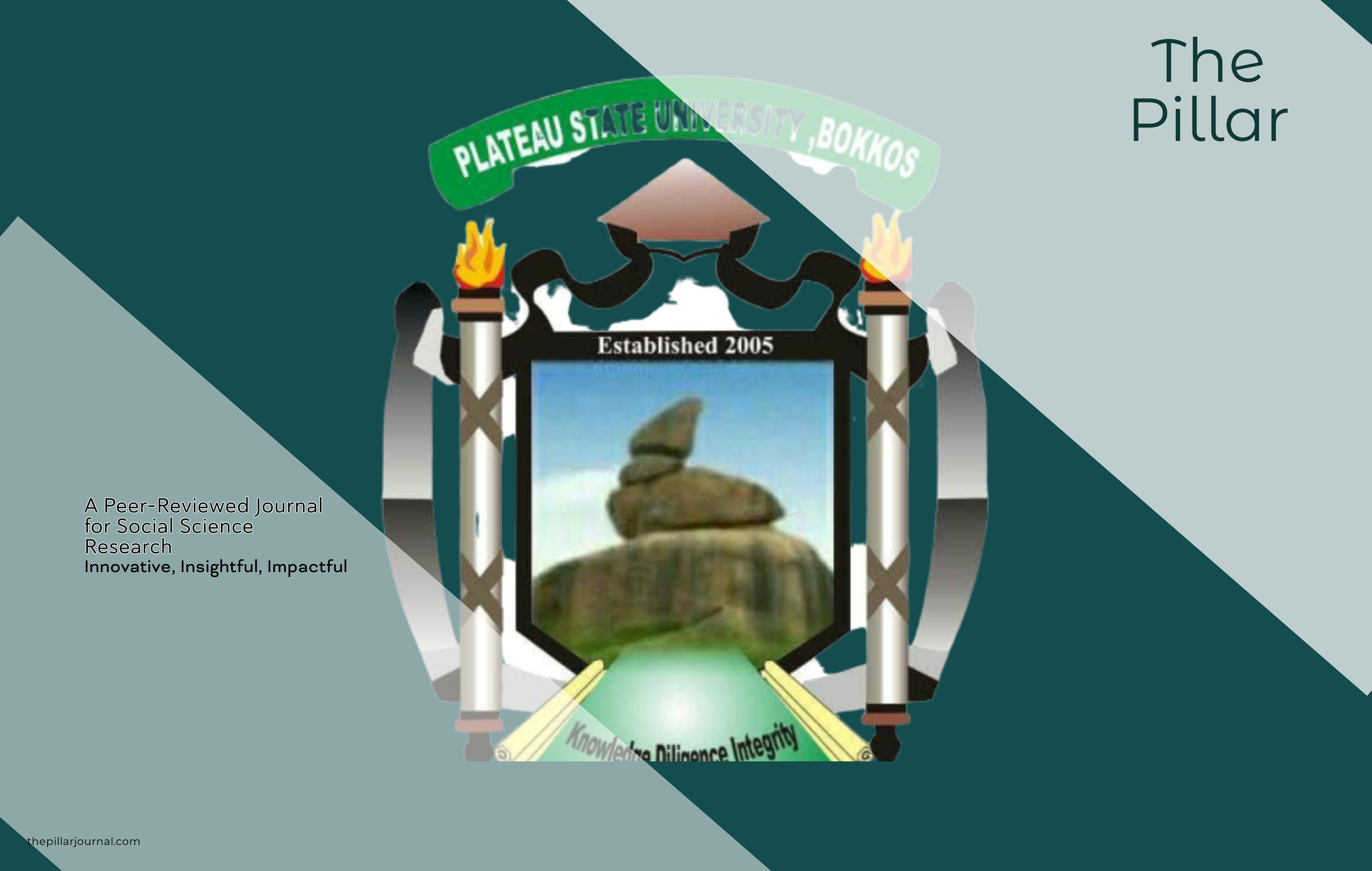IMPACT OF FEDERAL GOVERNMENT EXPENDITURE AND ECONOMIC GROWTH IN NIGERIA (1981-2022)
DOI:
https://doi.org/10.5281/zenodo.15389805Keywords:
Capital expenditure, Recurrent expenditure, Economic growth, Fiscal PolicyAbstract
This study assessed the impact of federal government expenditure on economic growth in Nigeria from 1981-2022. The purpose of federal government expenditure is essentially to stimulate economic growth, however, the extent to which federal government expenditure engenders growth has continued to generate theoretical and empirical debate. Conceptual and theoretical literature on federal government expenditure and economic growth were critically reviewed. Empirical evidence on the relationship between the federal government and economic growth were also reviewed. the Federal Government recurrent expenditure on administration has a coefficient of β= -19.56759 and a p-value of 0.0917, the coefficients of Federal Government Capital Expenditure on Social and Community Services (FGCSCS) were determined to be β = 22.88605, with a corresponding p-value of 0.0430, the Federal Government Recurrent spending on social and community services has a coefficient of β=33.53082 and a p-value of 0.0034, that the coefficient for Federal Government Recurrent Expenditure on Economic Services (FGRES) is positive, with a p-value of 0.0857. The analytical tool adopted for this study is the Auto Regressive Distribution Lag model and error correction mechanism. Other econometric tests such as unit root and cointegration tests were carried out to determine stationarity of series and long run relationship between federal government and economic growth in Nigeria for the period under study. The bounds test of cointegration revealed the presence of a long run relationship among the variables, while the error correction mechanism indicated a speed of 33.83% convergence to long run equilibrium. The analysis revealed that federal government’s capital expenditures on administration, social and community services and economic services have a significant impact on economic growth. Thus, the study establishes that federal capital expenditures impact more on economic growth in Nigeria than recurrent spending during the period under study. It was therefore recommended that the Federal Government of Nigeria through the relevant authorities should allocate a larger portion of its budget to sectors that significantly stimulate and promote growth in productive sectors, thus accelerating the growth of the Nigerian economy.
References
Abdullah, H. A. (2000). The Relationship between Government Expenditure and Economic Growth in Saudi Arabia. Journal of Administrative Science, 12(2): 173-191.
Al-Yousif Y. (2000). Does Government Expenditure Inhibit or Promote Economic Growth: Some Empirical Evidence from Saudi Arabia. Indian Economic Journal, 48(2).
Cooray, A. (2009). Government Expenditure, Governance and Economic Growth. Comparative Economic Studies, 51(3):401-418. http://www.ingentaconnect.com/content/pal/ces;jsessionid=q1g8lgkzfvms.alie.
Ehiogu, U., Okezie, A. I., & Chinedu, N. (2013).Causal Relationship between Nigeria Government Budget Allocation to the Education Sector and Economic Growth
Ighodaro, C. A., & Oriakhi, D. E. (2010). Does the Relationship between Government and Economic Growth follow Wagner’s law in Nigeria? Annals of the University of Petrosani, Economics, Vol. 10, issue 2. 185-198.
Loto, M. A. (2011). Impact of Government Sectoral Expenditure on Economic Growth Journal of Economics and International Finance. Vol. 3(11): 646-652.
Nworji, D., Okwu, A., Obiwuru, C. & Nworji, L. (2012). Effects of Public Expenditure on Economic Growth in Nigeria: A Disaggregated Time Series Analysis. International Journal of Management Sciences and Business Research, 2012, Vol. 1, Issue 7. http://www.ijmsbr.com/Volume%201,Issue%207%20%286%29%20Andy.pdf
Olawunmi, O., & Ayinla, T. (2007). Fiscal Policy and Nigerian Economic Growth. Journal of Research in National Development. Vol. 5 (2).
Nimenibo, A., & Samuel, W. A., (2020). The Empirical Evaluation of How Public Expenditure Influences Economic Growth in Nigeria. Global journal of Management and business Research, 20(B2), 53-67
Nurudeen, A., & Usman, A. (2010). Government Expenditure and Economic Growth in Nigeria, 1970-2008: A Disaggregated Analysis. Business and Economic journal, 2010, 1-11
Okpabi, A. S., Ijuo, A. O., & Akiri, S. E. (2021). Government Expenditure and Economic Growth in Nigeria. Journal of Economics and Finance, 12, issue 1, pp 28-35.
Onifade, S.T., Cevik, S., Erdogan, S., Asangu S., & Bekun F.V. (2020) An Empirical Retrospect of the impact of Government Expendit6ure on Economic Growth: New Evidence from the Nigerian Economy. http://doi.org/10.1186/s40008-020-0186-7
Ranjan, K. D., & Sharma, C. (2008). Government Expenditure and Economic Growth: Evidence from India. The ICFAI University Journal of Public Finance, 6(3): 60-69. http://ssrn.com/abstract=1216242

Downloads
Published
Issue
Section
License
Copyright (c) 2025 THE PILLAR JOURNAL OF SOCIAL SCIENCES

This work is licensed under a Creative Commons Attribution-NonCommercial 4.0 International License.
How to Cite
Similar Articles
- Odo Christopher Uba, Monday Hassan Zitta, THE IMPACT OF FARMERS AND HERDERS CONFLICTS ON SOCIO-ECONOMIC ACTIVITIES IN BOKKOS LOCAL GOVERNMENT AREA COUNCIL OFPLATEAU STATE , THE PILLAR JOURNAL OF SOCIAL SCIENCES: Vol. 1 No. 3 (2025): THE PILLAR: JOURNAL OF FACULTY OF SOCIAL SCIENCES
You may also start an advanced similarity search for this article.
